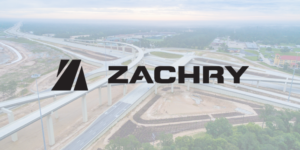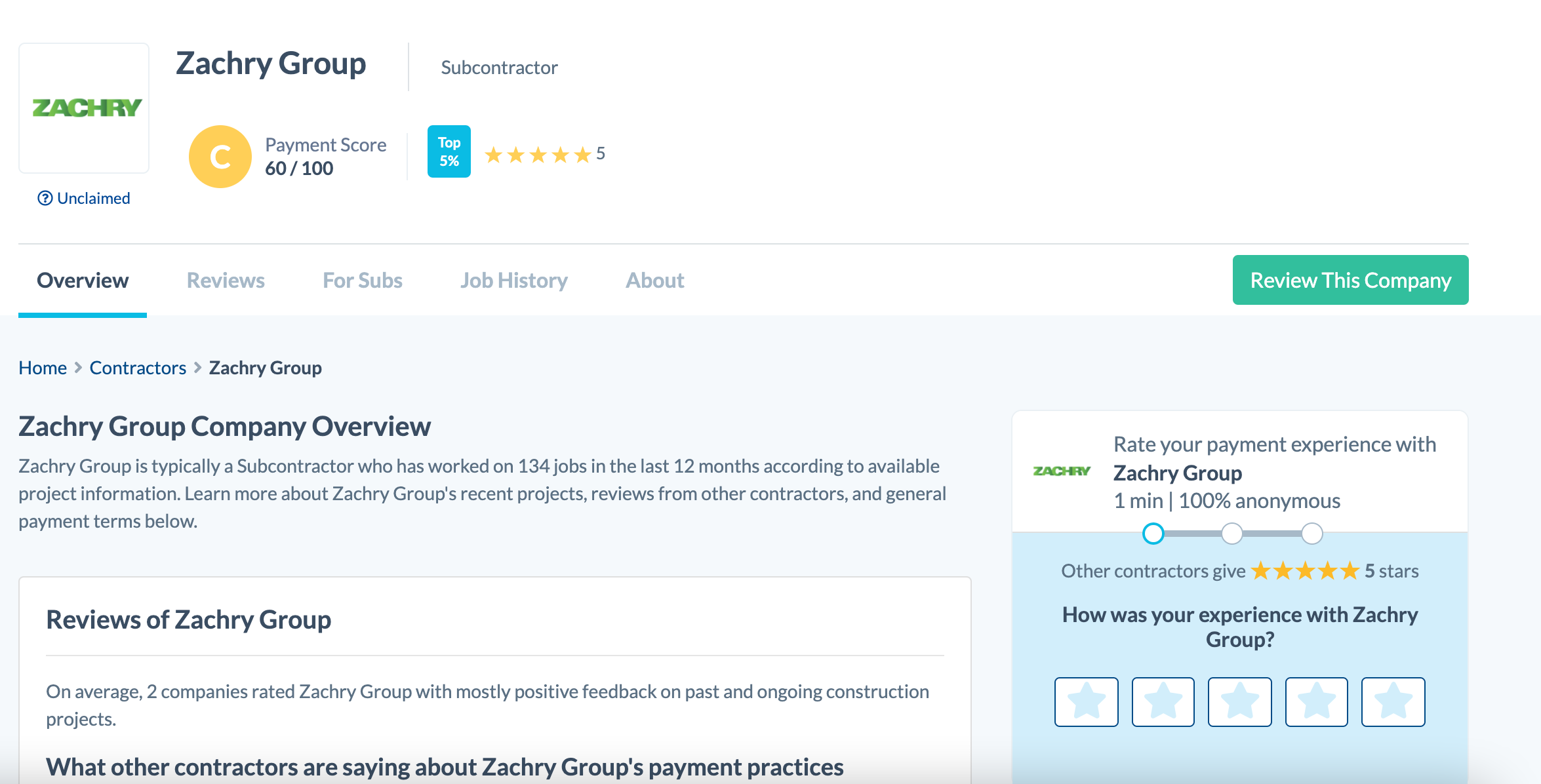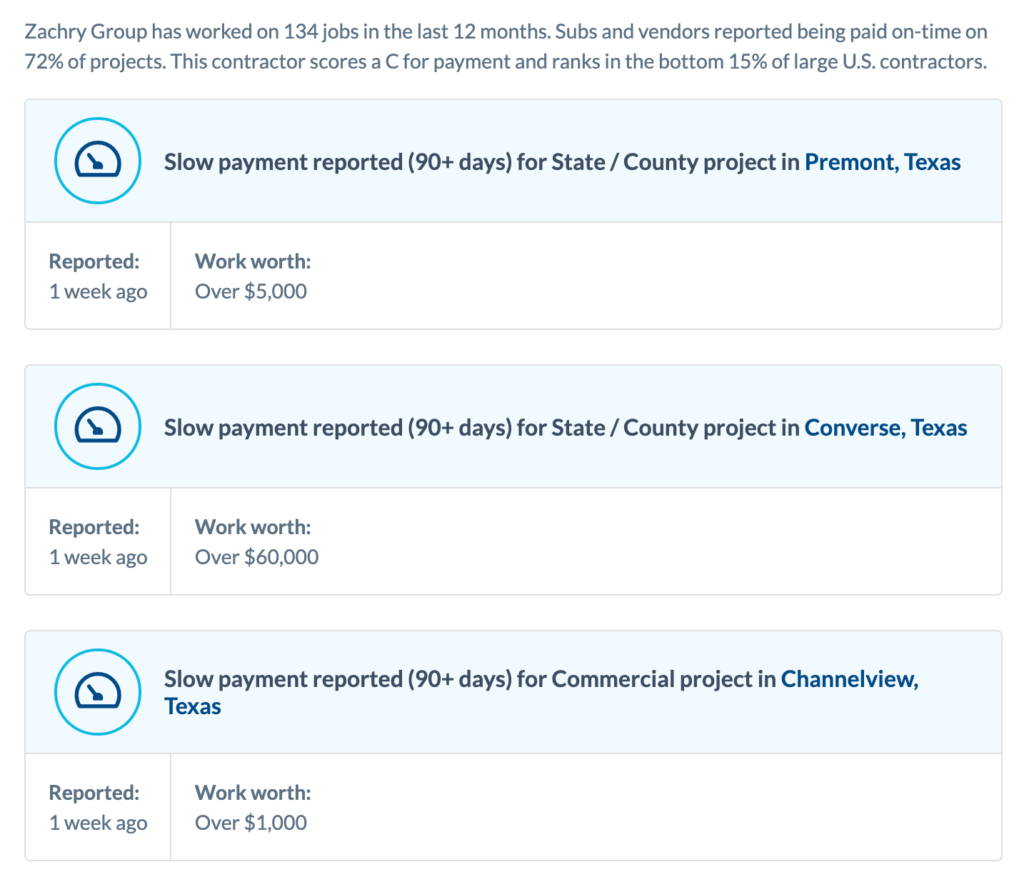
If you’re outgrowing your current list of general contractors, it might be time to move on to bigger and better things. Partnering with Zachry Group might be an excellent move for your business — if your company values and Zachry’s align. Ensuring that the relationship is worthwhile takes research. This guide to Zachry Group for subcontractors will provide all the information and background you need to make a decision about working with them.
Zachry Group: Company overview
Zachry Group is a San Antonio–based general contractors and engineering firm. The company started in 1924 when H.B. “Pat” Zachry resigned from the Texas Highway Department to begin his own business. His first contract was building a series of four concrete-reinforced bridges in Laredo, Texas.
In the years that would follow, H.B. Zachry Company would focus its efforts on infrastructure projects, tackling highways and pipelines. Some of the company’s early crowning achievements were its involvement in completing the Texas-New Mexico Pipeline and the “Big Inch” Pipeline between Texas and Kentucky.
By the 50s, Zachry found itself involved in the energy industry, completing the W.B. Tuttle Steam Power Plant in San Antonio. By 1965, it was working on the Jose Cabrera Power Plant, a nuclear plant, in Madrid, Spain. Around the same time, Zachry began the modular construction on the Hilton Palacio del Rio. A few years later, Zachry began building projects at Texas A&M, proving the company was truly multidisciplinary — something the company would carry on to the present day.
Beyond those projects, Zachry Construction has managed:
- Houston Ship Channel Bridge – Houston, Texas
- George Bush Turnpike – Rowlett, Texas
- Eastside Reservoir – Hemet, California
- Saws Brackish Groundwater Desalination project – San Antonio, Texas
- Briscoe Western Art Museum – San Antonio, Texas
- Embassy of the United States – Beijing, China
- Embassy Suites Landmark Centre – San Antonio, Texas
- Methodist Children’s Hospital Expansion – San Antonio, Texas
- Texas A&M San Antonio – San Antonio, Texas
- Ford Hood Georgetown Bridge Replacement – Fort Hood, Texas
- Fort Hood Motor Pool Repair – Ford Hood, Texas
Zachry Construction operates four office locations, including:
- San Antonio, Texas (Corporate HQ)
- Dallas, Texas
- Houston, Texas
- Morrisville, North Carolina
- Champaign, Illinois
- Charlotte, North Carolina
- Downers Grove, Illinois
- Corpus Christi, Texas
- Pasadena, Texas
- Hammond, Indiana
- Maryland Heights, Missouri
- Tulsa, Oklahoma
- Omaha, Nebraska
- Pasig City, Philippines
- Pasadena, Texas
- Nederland, Texas
- Freeport, Texas
- Port Allen, Louisiana
- Salt Lake City, Utah
- Santa Fe Springs, California
- Burlington, Washington
- Geismar, Louisiana
- Edmonton, Alberta
- Cochrane, Alberta
- Sarnia, Ontario
- Point Lisas, Trinidad and Tobago
As of ENR’s 2020 Top 400 Contractors, Zachry Group ranks 34, down three spots from 2019’s 31.
Before working with Zachry Construction
Before you start working with Zachry Construction (or any general contractor, for that matter), you have to do as much research as possible. You want to know as much about the prospective GC as possible so you’ll be able to make an informed decision about working with them. It’s helpful to think of it as prequalification. After all, the GC is prequalifying you; don’t you think you should do the same?
When you’re prequalifying a general contractor, follow these guidelines:
- Dig into the company’s payment history
- Review the company’s credit history
- Read subcontractor reviews
- Check out a sample subcontract, if available
- Familiarize yourself with the company’s payment process
Now understand one thing: Anytime you dig, you’re going to find dirt. It’s no different when you’re prequalifying a GC. Zachry Group is nearly 100 years old; it’s bound to have a rough spot or two in its past. The construction industry is a tough one, and a crossed subcontractor is far more likely to complain online than a happy sub is to commend a GC publicly.
If you find a few things that stick out as red flags, don’t write off Zachry (or any GC) right away. Instead, reach out to the company and ask about the issue. If the GC is upfront about what happened, it can be far more telling about what it’s like to work with them than a bad review on the internet.
Zachry Group’s payment profile
Zachry Group’s payment profile shows a payment score of 60 out of 100, earning it a C rating. Reasons for this score can be slow payments, disputes, and liens, and we’ll go into that in more detail in a bit.

For some payment profile background: A payment score is given to a contractor after collecting data about their payment practices on projects they manage. The data is compared against the scores of thousands of other contractors, and a payment score develops. These scores give subcontractors a baseline to use for comparing GCs against one another before partnering with them.
Learn more about how a contractor’s scores are calculated here.
Payment disputes
A payment score is a helpful baseline, but looking at a contractor’s payment disputes and reviews can offer an even better look at what they’re like to work with.
In the past 12 months, subs named Zachry Group in the following disputes:
- A sub filed a lien on July 15, 2020, on a project in Houston, Texas. The amount of the lien was $5,557.96, and it’s still active.
- In December 2020, a lien was threatened on a project in Panama, Oklahoma.
- In July, 2020, a lien was threatened on a project in Houston, Texas.
Slow payments
There were also over 90 reports of slow payments by subcontractors on projects managed by Zachry. It’s important, however, to remember that Zachry Group works on many projects at a time, so percentages might be more helpful for understanding payment practices.
- In the last 12 months, 72% of Zachry Group projects went off without a report of payment issues
- That number drops to 57%in 2021 alone
- In 2020, the percentage of Zachry projects free from payment incidents was 75%
- 2019 saw a 81% representing incident-free projects
- Zachry’s strongest year was 2018, when 99% of the projects it managed went without payment incident

Subcontractor feedback
While those numbers and percentages might be red flags, just one contractor left a written review, and they had this to say about working with Zachry:
“Zachry Group is always a fantastic team to work with. We’ve never had a problem with them on our Texas jobs.”
That review aligns with Zachry’s inclusion in the 2020 Top Contractors for Fair Payment.
Getting paid with Zachry Group
Zachry Group’s payment profile might not be stellar, but things happen in construction. Because the industry is so unpredictable, you’ll want to learn as much about a general contractor and their payment policies before contracting with them.
Subcontractor and vendor registration
Before you can even bid on a project with Zachry Group, you need to be on their vendor registration list. Zachry also supplies some supplemental contractor requirements to peruse. These include drug and alcohol program requirements, environment rules, safety requirements, and incident investigation reports for subcontractors.
Before work starts
Regardless of your role on a Zachry Group–managed project, there are some upfront documents you’ll have to provide. They usually include:
- Your W–9
- The signed subcontract
- Insurance certificates
- Any bonding information related to the project
The project manager that will oversee your role on the project will contract you for these documents and any additional requirements Zachry Group might have.
First payment
Zachry Group’s offices might mostly reside in Texas, but the company has global influence. When a construction company gets that large, it tends to systemize everything it can to ensure that staff at different locations can be on the same page.
For that reason, large GCs like to use industry-standard documents like AIA billing, G702 payment applications, and G703 continuation sheets for billing.
Be sure to ask the project manager about when payment applications are due each month. This is usually on the 1st, 5th, 15th, or 20th of each month, but it does fluctuate depending on the contractor and the project.
Progress payments
Zachry Group works on a lot of commercial projects, highways, and pipelines, and these jobs take years to complete. You don’t have years to wait for payment, so be sure to use progress payments to keep the cash coming in each month.
While you’re sending in your payment application, be sure to include an updated schedule of values to streamline the process.
Project closeout
Each general contractor has its own methods for closeouts, and Zachry Group is no different. However, there are some typical documents and processes you’d be smart to expect. They include:
- Punch lists
- Certificates of occupancy
- Certificates of substantial completion
- Lien waivers
- Inspection certificates
But before you go jumping headlong into closeout paperwork, pump the brakes. Retainage and final payments are great, but closeout is the stage where lien waivers are likely to pop up. Read each document carefully so you don’t accidentally give away your lien rights to a payment you haven’t received yet.
3 tips to getting paid on every construction project
It doesn’t matter how good a general contractor is; things will always happen in this line of work. But if you use the following three tips, you’ll be in the driver’s seat when it comes to protecting your payments and cash flow.
1. Send preliminary notices on every job
If you aren’t already sending preliminary notices on all of your projects, it’s time to start. Many states require contractors and subs to send preliminary notices to preserve their rights to mechanics liens. If a payment dispute arises, that little document could mean everything.
Even if you’re working on a project in a state that doesn’t require preliminary notices, send them anyway. They also serve as friendly, professional introductions between your company and the people cutting the checks. Those are some important folks to know.
2. Establish visibility and communication
Preliminary notices are essential, but there are other visibility documents that are just as critical. If your invoice is sitting at the bottom of a stack, sending an invoice reminder can help bring that bill to the top of the heap. And, if a reminder doesn’t help, a notice of intent to lien sure will.
3. Make mechanics liens rights a priority
You’re partnering with a larger GC to grow your business and make more money. But money on paper doesn’t matter if you’re not protecting your payments. Even if you’ve worked with a general contractor in the past, make your lien rights a priority.
The best way to do that is to become familiar with the mechanics lien laws in the state in which you’re working. These powerful tools are the fastest way to speed up payments during a dispute. They can even force the sale of the property if the owner doesn’t make good on the past due amount. For that reason, states have very strict requirements that contractors must meet to protect their rights. Make sure you’re familiar with them so you’ll have recourse in the event of a dispute.